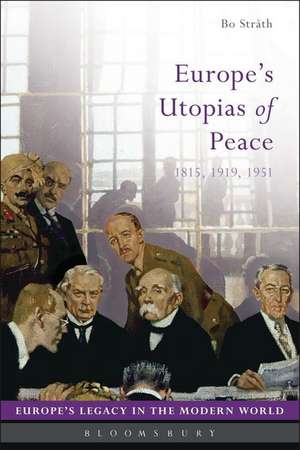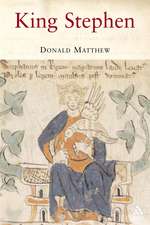Europe's Utopias of Peace: 1815, 1919, 1951: Europe’s Legacy in the Modern World
Autor Bo Stråthen Limba Engleză Paperback – 27 ian 2016
| Toate formatele și edițiile | Preț | Express |
|---|---|---|
| Paperback (1) | 267.60 lei 6-8 săpt. | |
| Bloomsbury Publishing – 27 ian 2016 | 267.60 lei 6-8 săpt. | |
| Hardback (1) | 781.38 lei 6-8 săpt. | |
| Bloomsbury Publishing – 27 ian 2016 | 781.38 lei 6-8 săpt. |
Preț: 267.60 lei
Preț vechi: 300.67 lei
-11% Nou
Puncte Express: 401
Preț estimativ în valută:
51.21€ • 54.76$ • 42.69£
51.21€ • 54.76$ • 42.69£
Carte tipărită la comandă
Livrare economică 18 aprilie-02 mai
Preluare comenzi: 021 569.72.76
Specificații
ISBN-13: 9781474237727
ISBN-10: 147423772X
Pagini: 552
Dimensiuni: 156 x 234 x 33 mm
Greutate: 0.86 kg
Editura: Bloomsbury Publishing
Colecția Bloomsbury Academic
Seria Europe’s Legacy in the Modern World
Locul publicării:London, United Kingdom
ISBN-10: 147423772X
Pagini: 552
Dimensiuni: 156 x 234 x 33 mm
Greutate: 0.86 kg
Editura: Bloomsbury Publishing
Colecția Bloomsbury Academic
Seria Europe’s Legacy in the Modern World
Locul publicării:London, United Kingdom
Caracteristici
Weaves together the intellectual and diplomatic history of there distinct post-war eras within a single volume
Notă biografică
Bo Stråth is Professor Emeritus at the University of Helsinki, Finland. He has written widely on conceptual history and the history of European integration. His recent publications include States and Citizens: History, Theory and Prospects (2003), The Political History of European Integration (2010) and A European Memory? Contested Histories and Politics of Remembrance (2013).
Cuprins
AcknowledgementsIntroduction: Utopia, History and Teleology: The Bicentenary European Search for a Political Economy for Welfare and Warfare, and Struggle with Nationalism and Democracy 1. The Vienna Peace Utopia of 1815 and the World of Trade2. Welfare: The Dissolution of the Vienna Peace Utopia from Within3.Warfare: The Dissolution of the Vienna Peace Utopia from Without4. Versailles: the Utopia of Peace through Democracy5. The Great Depression and the Collapse of the World Order6. After World War II: From the Utopia of Peace for the Cold War to the Euro-Crisis and the Search for a New NarrativeEpilogue: The Bicentenary European Struggle with Nationalism and Democracy, and Search for a Global Political EconomyBibliographyIndex
Recenzii
The book impresses with an amazing literacy, a masterful overview of the current status of research and committed commentaries.
This is a major and wide-ranging history of Europe from the Congress of Vienna in 1815 through the Versailles Treaty of 1919 to the Schumann Plan of 1950. Strath masterfully reconstructs the history of Europe around how these utopias of peace sought to overcome the legacy of war. It is a significant study that shows how the post-second world project of European integration must be understood in the context of modern European history since the French Revolution. He shows with great acumen how new designs for political economy emerged around plans for international peace.
Stråth's detailed and well-documented book argues a strong case . By isolating the concept of utopia, giving it thorough attention, and describing its evolution, Stråth has made a significant contribution to the historical literature on peace.
This is a major and wide-ranging history of Europe from the Congress of Vienna in 1815 through the Versailles Treaty of 1919 to the Schumann Plan of 1950. Strath masterfully reconstructs the history of Europe around how these utopias of peace sought to overcome the legacy of war. It is a significant study that shows how the post-second world project of European integration must be understood in the context of modern European history since the French Revolution. He shows with great acumen how new designs for political economy emerged around plans for international peace.
Stråth's detailed and well-documented book argues a strong case . By isolating the concept of utopia, giving it thorough attention, and describing its evolution, Stråth has made a significant contribution to the historical literature on peace.
















